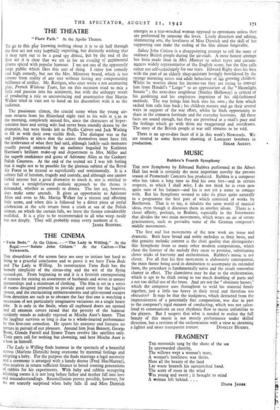MUSIC Rubbra's Fourth Symphony THE new Symphony by Edmund Rubbra
performed at the Albert Hall last week is certainly the most important novelty the present season of Promenade Concerts has produced. Rubbra is a composer who has taken a long time to find his own feet—and in certain respects, to which I shall refer, I do not think he is even now quite sure of his balance—and his is not yet a name to conjure with. But his Symphony seemed to take its place quite naturally in a programme the first part of which consisted of works by Beethoven. That is to say, it inhabits the same world of musical ideas, even though it discusses them in another idiom. There is a closer affinity, perhaps, to Brahms, especially in the Intermezzo that divides the two main movements, which wears an air of serene graciousness, such as pervades some of the German composer's middle movements.
The first and last movements of the new work are tense and dramatic. Both have broad and noble melodies as their basis, and this genuine melodic content is the chief quality that distinguishes this Symphony from so many other modem compositions, which cheat the listener of the melody they seem to promise, substituting clever tricks of harmony and orchestration. Rubbra's music is not clever. For all that his first movement is elaborately contrapuntal, the main theme being used in diminution to accompany its extended form, the procedure is fundamentally naive and the result somewhat clumsy in effect. The clumsiness may be due to the orchestration, which is apt to be thick owing to too much doubling of parts and a not too skilful use of the brass. And are not the " obstinate basses," which the composer uses throughout to weld his material firmly together, just a little too heavy in their tread and therefore too obtrusive? It may be that the stodginess, which detracted from the impressiveness of a potentially fine composition, was due in part to the composer's rigid manner of conducting, which was not calcu- lated to communicate an easy rhythmic flow to music unfamiliar to the players. But I suspect that what is needed to realise the full beauty of this music is not merely performance under skilled direction, but a revision of the orchestration with a view to obtaining a lighter and more transparent texture. DYNELEY HUSSEY.


























 Previous page
Previous page